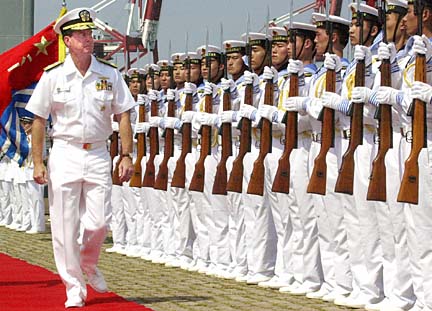


The Rising East
U.S. finds Chinese cagey
about military discussionsA senior Pentagon official has just completed an inconclusive visit to Beijing where he failed to find a way for American and Chinese military forces to resume professional contacts.
Peter Rodman, assistant secretary of defense for international security, succeeded only in identifying points of contention, according to U.S. officials. Rodman met with Defense Minister Chi Haotian, the chief of general staff of the Peoples Liberation Army (PLA), Xiong Guangkai, and vice minister of Foreign Affairs Li Zhaoxing.
"Both sides talked at each other and it was all very polite," said a U.S. official, "but it was not conclusive." In Washington, Rodman and other top officials are discussing Rodman's findings before recommending the next step to President Bush.

|
At issue are military-to-military contacts in which Chinese officers visit American bases, Chinese ships make port calls in the U.S., and Chinese defense officials attend U.S. conferences on security matters. In return, American officers, ships and officials visit China.Those exchanges all but came to a halt in April last year after a Chinese jet collided with a U.S. Navy EP-3 surveillance aircraft. The Chinese pilot was killed and the American crew made an emergency landing on China's Hainan island.
In Beijing, Rodman ran into three stumbling blocks: reciprocity, transparency and consistency.
In the first, American officials have long asserted that the U.S. is far more open with the Chinese than the Chinese have been with Americans. Chinese officers are shown U.S. forces in realistic training and are given ship and base tours but are not shown anything secret, including U.S. logistics. The Chinese, however, have shown the Americans much less.
That leads to the second problem, a lack of Chinese transparency. Part of Chinese reticence appears due to an intrinsic tendency to secrecy. In addition, some Americans speculate, the Chinese may be embarrassed because their forces are not so well trained and armed as the Americans. "They just don't want us to see how bad they are," said one officer.
Third, the U.S. wants a guarantee that military exchanges will not be cutoff whenever there is a contentious issue between Washington and Beijing. The Chinese have been inconsistent, for instance, in permitting U.S. warships to call at Hong Kong.
Chinese officials say the PLA is ready to resume the contacts because there is much to learn from the Americans and contend that the underlying problem is that the Bush administration has not decided its policy on China.
Some U.S. officials agree on the latter point, saying that a vigorous debate runs through the upper echelons of the Bush administration, with hardline conservatives arguing against the exchanges.
Rodman himself seems to advocate a measured approach. Before he came to office, he wrote that an intelligent American strategy would offer "China a constructive course as a positive alternative to a collision course."
Many senior U.S. military officers have become advocates of a carefully crafted exchange program with China. The commander of U.S. forces in the Pacific and Asia, Adm. Thomas Fargo, has told Congress: "I am support of a modest military-to-military relationship."
"It's clear to me," the admiral said in written response to questions, "a frank, constructive discourse that's clearly aimed at preserving peace and stability throughout the region should be the way ahead."
American officers see three benefits to the United States in such discourse:
>> Deterrence: By showing the Chinese some capabilities of U.S. forces, American officers seek to deter the Chinese from miscalculating. Watching a 23-year-old staff sergeant put an Abrams tank through its paces in the California desert will give the Chinese pause, they hope.Hawaii can be a particularly effective stop for Chinese officers. The USS Arizona, resting on the bottom of Pearl Harbor where Japanese warplanes sank her on Dec. 7, 1941, represents America's greatest military defeat. But 200 yards away stands the USS Missouri, the battleship on which the Japanese surrendered in Tokyo harbor less than four years later.>> Communication: American officers have sought to relieve a long-standing Chinese anxiety by reassuring them that the U.S. has no plans to contain China.
>> Intelligence: U.S. satellites and surveillance aircraft can count Chinese ships, planes and missiles. Only face-to-face conversation can tell Americans something of the attitudes, training and experience of their Chinese counterparts.
The lesson should be clear.
Richard Halloran is a former correspondent
for The New York Times in Asia and a former editorial
director of the Star-Bulletin. His column appears Sundays.
He can be reached by e-mail at rhalloran@starbulletin.com